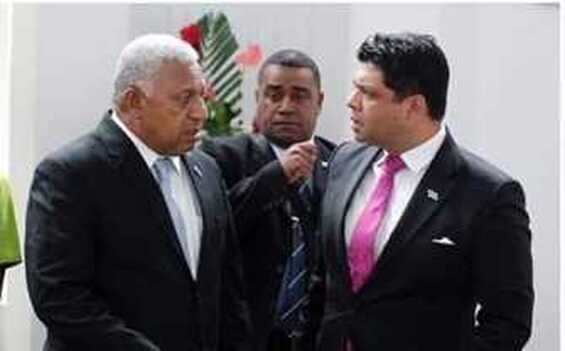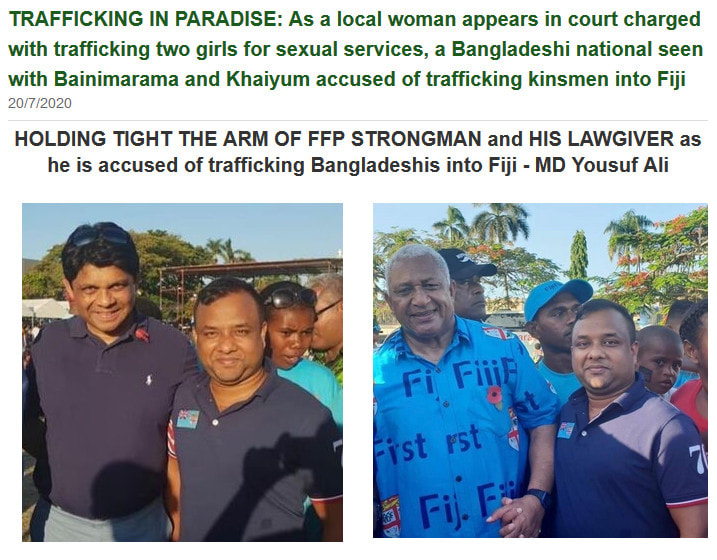ALLAH'S SPECIAL ONE
"The AG also appears to have a sense of destiny, which may account for his almost total lack of self-doubt. I have sighted correspondence from a co-religionist telling him that Allah has chosen him to lead. But whether or not he is the Chosen One, elections are decided in the sphere of the temporal. The blessing of the Almighty doesn’t guarantee the blessing of a fickle electorate when polling day comes around and especially when they are already in a mood to punish."
Graham Davis
FOR THE RECORD: Fijileaks, December 2017: Maulana Ahmed Nakshabandi from Hyderabad in India (with Aiyaz Khaiyum below) spoke at the Prophet Mohammed's Birthday celebrations in Ba's Maururu Jamie Mosque. Aiyaz Khaiyum and Faiyaz Koya were chief guests at the Maunatul Islam Association of Fiji. A video recording of the event (hear below) revealed that the Maulana had described Khaiyum as 'King of Fiji - Fiji Ke Raja). But opinion is divided on whether Khaiyum is 'Sultan of Fiji' or 'King Fisher'.
"The AG’s chronic unpunctuality isn’t new – as literally thousands of people over the past 14 years can attest – though as his budget performance showed, it has reached new heights of self-indulgence. It is in stark contrast to the Prime Minister, whose military background has instilled in him a respect for the time and who is rarely late for any function. When I first went to work directly to the AG, I raised his constant lateness as a concern, and especially when he would arrive at public functions after the PM – a breach of etiquette in any country but especially disrespectful in the eyes of the iTaukei. But he appears resolutely unconcerned about any offence this causes, ostentatiously arriving at functions sometimes long after their starting time, with his phone-carrying, water-carrying, pen-carrying security detail giving him the air of being the leader himself and certainly someone for whom the normal rules of behaviour don’t apply."
Fijileaks: In 1987, shortly after a series of bomb explosions in Suva, he was the first one to hop on the plane and flee to Australia. He didn't wait for instructions, or to find out if his junior lieutenants were dead or alive. He had fled faster than the southerly South Pacific trade wind. We waited, and waited, and waited but there was no sign of him in Fiji
"Few people give the government any hope of winning again in 2022 with him in its ranks and even fewer support the notion of Aiyaz Sayed-Khaiyum as Frank Bainimarama’s successor, which has always been his ambition. As we’ll examine in more detail in the weeks to come, his support among his cabinet colleagues and the military has crumbled since the 2018 poll – aside from those MPs dependent on his patronage – and Frank Bainimarama is now said to be his last refuge. While in his public utterances, the Prime Minister sticks to the scripts written for him by Qorvis and the AG, privately it’s said to be a somewhat different story as the extent of the country’s dire economic predicament sinks in. As someone close to the PM describes his current attitude to the AG: “He f***ed it up. He can fix it.” If he can’t, of course, a day of reckoning is inevitable. Yet others in the cabinet and the military believe that reckoning should be brought forward to give the government time to regroup with a revised line-up capable of winning back the confidence of the people and stave off defeat in 2022." READ FULL ANALYSIS BELOW:

By GRAHAM DAVIS: “I’m late, I’m late, for a very important date”, laments the White Rabbit to Alice in the Disney adaptation of Lewis Carroll’s 1865 classic, Alice’s Adventures in Wonderland. At 7.30 pm on the evening of Friday, July 17, 2020, Fiji’s Attorney General and Minister of Economy, Aiyaz Sayed-Khaiyum, had a very important date with the nation to deliver the 2020-21 national budget to an anxiously waiting public. Yet as the minutes ticked by, the Fijian people – glued to their television and computer screens or hunched over their radios – suddenly found themselves down the rabbit hole with Aiyaz as they waited, and waited and waited.
It was easily the most critical budget in recent history – the FijiFirst government’s considered response to the Covid-19 pandemic that has plunged the world into crisis and is ruining the economies of already vulnerable nations such as Fiji. The Prime Minister had just announced that 115,000 Fijians had already lost their jobs and counting. Western Viti Levu – as the epicentre of tourism – had been especially hard hit as borders closed and the planes stopped coming. To stay afloat, Fijians were already raiding their retirement savings in the national superannuation fund, the FNPF – money they knew they would no longer have in their twilight years but that the AG was shamelessly describing as “government assistance”. So as they gathered to learn of the government’s spending plans for the coming year, the mood in every household was one of anticipation coupled with a great deal of apprehension and anxiety.
If ever there was a time for a government to rise to the occasion and give reassurance and comfort to the people who had entrusted it to be custodian of the nation’s affairs, this was it. Yet instead, the AG sank to the occasion with an astonishing display of hubris and disdain for the people who put him there. The minutes ticked by with no explanation as to why the budget announcement in the parliament hadn’t started. The commentators on FBC and Fiji TV became increasingly long-winded and repetitive. “We are still waiting for the most historic budget in recent years etc”. On it went ad infinitum. No-one on air had the temerity to say “where is he?” That would be a career defining moment for anyone with the cheek to do so. But pretty soon the impatience at home turned to annoyance and anger. And social media began to erupt with a withering collective attack on the AG’s tardiness and the government’s lack of consideration. The end of another tough working week (assuming you still had a job), tired kids to put to bed and gut-churning worries about putting food on the table, and this is how they treat us?
The minutes, quarter hours and half hours ticked away, still with no explanation as to the delay. Joel Abraham, the CEO of the Competition and Consumer Commission, had long become tedious on Fiji TV as over and over, he massaged the boss’s messaging in yet another glaring conflict of interest. The repetitive dirge that passes for music before the commencement of the parliamentary online feed became aural torture. And then 80 minutes later – yes, an hour and 20 minutes after the scheduled starting time – the AG finally rose to his feet in the parliament.
It was 8.50 pm. The entire nation listened for an explanation as to why they’d been kept waiting. Tying up some loose ends? Concluding yet another loan to keep us afloat? Perhaps your dog ate the speech and you had to print it out again? Maybe your wife forgot to iron your shirt? Anything, AG, anything to explain why you kept us waiting for an hour and 20 minutes. But no such luck. Not a word of explanation or regret, let alone apology. Just straight into the budget speech as if nothing had happened.
If this was an isolated incident – one act of tardiness in a lifetime of punctuality – it would still have been grounds for caustic comment. Keeping an entire nation waiting during prime family time on a Friday night without so much as a by your leave. But this was no isolated incident. The adage “never apologise, never explain” has been variously attributed to Winston Churchill, Gertrude Stein, Benjamin Disraeli and John Wayne. But it has truly been developed into an art form in Fiji by Aiyaz Sayed-Khaiyum, whose disdain for common courtesy and personal consideration has long been eroding his own credibility and that of the government as a whole. As we’ll examine in more detail in the coming weeks , it is hubris – exemplified by the AG’s behaviour – that took FijiFirst to the brink of defeat at the last election in 2018 and on all the available evidence, will sweep it from office at the next election in 2022.
For the Fijian people, there is some consolation. It’s nothing personal. The AG does it to everyone. He has created a new norm in which lateness is acceptable, routinely displaying disrespect not only to the voters but to the Speaker of the Parliament, his parliamentary colleagues and even the Prime Minister, Frank Bainimarama, to whom he owes his entire political career. This disrespect extends to visiting dignitaries – including ministers of other governments – and representatives of those governments in Fiji keen to assist the Fijian people in their unprecedented hour of need.
Take the case of the Ambassador for the European Union, Sujiro Seam, who used to represent France in Fiji before being given the job of representing all 27 member nations of the EU. It reportedly took the representative of the second largest economy in the world two weeks to set up a meeting with the AG to tell him that the EU was giving Fiji – not lending it – F$50-million in budget support over the next three years. That delay alone raised eyebrows in diplomatic circles in Suva, given the gravity of the local economic crisis every country with formal ties to Fiji can see. Yet according to a high-level source, when Ambassador Seam subsequently turned up for that meeting, he was kept waiting outside the AG’s office for 40 minutes.
Now imagine yourself in the same position. You want to give a struggling friend money to see them through a difficult time but they’re too busy to see you. And then when you eventually turn up to make the gift, you’re kept waiting outside their door. Most normal people would regard this as an affront and a sign of ingratitude. Yet this is how Fiji’s Minister of Economy – a relative nobody in global terms – treats the representative of a major global power willing to help dig him out of the budgetary hole he has dug for himself and for the nation. The fallout from high handed behaviour of this kind goes way beyond the AG’s personal reputation. Fiji is often accused by its Pacific island neighbours of arrogance but it goes to a whole new level when our elected representatives are arrogant towards major donors and development partners. It actually shames us in the eyes of our friends in the world.
The AG’s apparent formula to win friends and influence people is not merely to look a gift horse in the mouth but take a figurative whip to it. Because what did the EU get in return for its largesse? A budget announcement that Fiji is closing its embassy in Brussels altogether and transferring its operations to Geneva. No direct Fijian representation at the EU headquarters for the first time in 47 years. Ambassador Seam had the grace to say publicly that this was sad for Europe and he would try to get the decision overturned. But it’s much sadder for Fiji – reliant as we are on European aid – as was the equally startling announcement that our High Commission in Port Moresby is closing but the one in Abu Dhabi stays open. Melanesian solidarity takes a tumble but Arab solidarity stays intact.
The AG’s chronic unpunctuality isn’t new – as literally thousands of people over the past 14 years can attest – though as his budget performance showed, it has reached new heights of self-indulgence. It is in stark contrast to the Prime Minister, whose military background has instilled in him a respect for the time and who is rarely late for any function. When I first went to work directly to the AG, I raised his constant lateness as a concern, and especially when he would arrive at public functions after the PM – a breach of etiquette in any country but especially disrespectful in the eyes of the iTaukei. But he appears resolutely unconcerned about any offence this causes, ostentatiously arriving at functions sometimes long after their starting time, with his phone-carrying, water-carrying, pen-carrying security detail giving him the air of being the leader himself and certainly someone for whom the normal rules of behaviour don’t apply.
I once said to him: “AG, you would be a lot more popular if you showed more consideration and tried to build constituencies of support”. His testy response laid to rest any prospect of change. “I’m not interested in being popular! I’m interested in pushing through the reforms that need to made!” While the latter may be seen as commendable in a politician, the former is a clear sign of someone who probably shouldn’t be in politics at all. For popularity is a politician’s stock in trade. And when you lose it in a democracy, comeuppance is usually just around the corner.
Why does the AG think he is the exception to the rule? Partly, I think, because he has failed to appreciate the difference between top-down directives in a dictatorship and consultative leadership in a democracy and operates largely as he did before the return to parliamentary rule. But also because he inhabits his own bubble in which he is routinely told how brilliant he is and no-one dares mention his shortcomings. He is extremely sensitive to criticism, as we’ve seen repeatedly with his knee-jerk propensity to lash out publicly at even the mildest slight and perpetuate an aura of conflict around him. And he has come to expect the obsequiousness of those who work for him or who seek his patronage and the hagiography that passes for journalism in the newspaper he controls – the Fiji Sun.
The AG also appears to have a sense of destiny, which may account for his almost total lack of self-doubt. I have sighted correspondence from a co-religionist telling him that Allah has chosen him to lead. But whether or not he is the Chosen One, elections are decided in the sphere of the temporal. The blessing of the Almighty doesn’t guarantee the blessing of a fickle electorate when polling day comes around and especially when they are already in a mood to punish.
Much has already been written about last month’s budget – the massive blowout in the deficit and the unprecedented reliance on debt. No-one but the AG would drag the cameras in to picture him grinning broadly as he racks up another US$200-million in debt for the Fijian people, as happened last week with yet another big cheque from the ADB. It was just a year ago, in his last budget speech, that the AG was castigating previous governments for relying on loans to finance their recurrent spending. Yet that’s precisely what he is doing now himself, as well as increasing the debt to GDP ratio 30 per cent above the level the government inherited from Laisenia Qarase in 2006.
The AG is anxious to pin the blame for the government’s current predicament on the Covid-19 crisis but as I’ve pointed out before, he was in big trouble long before the coronavirus because of his overspending in the government’s last term leading up to the disastrous 2018 election. The budget shortfall was already some half a billion dollars before Covid after the failure of the AG’s privatisation plans to sell off public assets to raise revenue. As the shortfall mounted, he had desperately tried to make up ground by selling off a sizeable chunk of Energy Fiji Limited to the FNPF, though only half of what he had wanted to sell because the FNPF board objected. It was a clear case, in the eyes of the critics, of Fijians through their superannuation fund being obliged to buy something they already owned. The AG had been warned by his officials that the EFL share release would be unlikely to raise the amount of capital predicted but in desperation, he went ahead regardless. And his miscalculation was compounded by an over-optimistic prediction of the amount of tax the government would be able to raise, which made the budget deficit all the worse. And then, of course, along came Covid-19.
It’s all part of the crash through or crash approach that I’ve referred to before – the AG’s admiration for the high-risk brand of government decision-making that characterised the Whitlam government in Australia. The Whitlamesque approach is evident with this budget, with the AG gambling on being able to raise enough money in borrowings to carry the country through until Fiji’s borders can reopen and the planeloads of tourists return. Yet the odds are clearly against him so long as Covid-19 shows little or no sign of abating – especially in our principal tourism source markets of Australia and New Zealand. Maybe the AG will get lucky, maybe he won’t. As I say, crash through or crash. Yet it is rapidly becoming clear that without a vaccine, this crisis may well be open ended. Covid-19 as a permanent fact of life and years, if ever, before visitors return in the same numbers.
The AG’s underlying strategy is to keep the civil service afloat by borrowing rather than the alternative scenario put to him of a 50 per cent reduction in spending across the whole of government that would have cost jobs and caused considerable hardship. The theory is that if civil servants can keep their jobs even as workers in the private sector lose theirs, they are at least keeping the economy going. That is why Suva is relatively buoyant while Nadi and the rest of the West is hurting badly. Then there is the added political benefit of a grateful civil service in the lead-up to the 2022 election. Yet propping up the public sector with loans is obviously finite and if the Covid crisis doesn’t pass and those loans dry up, substantial job cuts in the civil service are inevitable in the next budget, along with significant reductions in government services. And all at a time when the government will be preparing to fight an election the following year.
Anyone looking for a fundamental change of direction in this budget towards reducing Fiji’s reliance on tourism was left disappointed. For years, the government has talked about a significant expansion of agriculture, with a bigger emphasis on value adding, to reduce imports and create a bigger export market but it has singularly failed to follow through. And while there was a raft of incentives to try to breathe life into the private sector and kickstart the jobs market, local investment is said to have largely dried up and foreign investors are bound to be cautious about putting their money into economies like Fiji because of their over-reliance on tourism and acute vulnerability and isolation at the present time.
Reducing taxes on cars, white goods and alcohol was all very well for the affluent and those still with jobs, but left many wondering about the wisdom of this when it comes to raising enough revenue for the growing army of disadvantaged. One of the country’s most prominent luxury car dealers privately confided that his own customers didn’t need a tax break and he couldn’t understand why they’d been given one. They would have still bought the vehicles he sells, however high the tax. And while the Covid crisis is enough to drive anyone to drink, many wondered if Fiji really needed to make alcohol more affordable when the country is already plagued by alcohol and drug abuse, along with high levels of violence against women and children. There’s an argument that cheaper alcohol might provide a safer alternative to the growing problem of methamphetamine addiction in Fiji. But in terms of benefitting the tourism industry, the AG’s obsession with a $12 glass of beer being a disincentive to attracting visitors counts for little when those visitors are unlikely to return in numbers anyway during the term of this budget.
Some other budget measures were also highly questionable, like using borrowed money that Fijians will have to repay to give the first 150,000 visitors to Fiji after the borders open $400 each towards the cost of their holidays. They don’t need the money but Fijians sure as hell do. And to spend $7-million on a new office for the Prime Minister at the present time is an act of gross political insensitivity. The argument that the construction will create jobs and benefit future leaders is beside the point. It’s the optics that count and this is not the time for such spending, full stop. There is an old saying that governments lose office because they are arrogant, incompetent or both. Regrettably, the government has long been displaying aspects of both. Yet in any event, building Taj Mahals for leaders when their people are suffering is the surest path to ignominy and defeat.
When I first joined the government on the comms side in 2012, I was struck by Frank Bainimarama’s standard question whenever anyone suggested an idea whose logic wasn’t immediately apparent to him. “How does that put food on the table for ordinary people?’ It was a beautifully simple ethos for national development not only in Fiji but any emerging economy. But it has been lost in the tortured rhetoric that invariably accompanies the AG’s speeches as he hectors various sectors of the community about their failings and struggles to outline a cogent vision for Fiji. He drew widespread derision during the last election campaign for his startling claim that given two more terms, the government would make Fiji better than Australia and New Zealand. They are developed economies, Fiji is not. And while no-one is suggesting the country shouldn’t aim high, Fiji is constantly struggling to bridge the chasm between the reality of an underperforming public sector and substandard service delivery and the AG’s lofty sentiments about becoming a modern nation state.
With dwindling means and genuine hardship emerging, it is surely time for the government to refocus its effort on some core values and principles and above all, cut Fiji’s suit to fit the available cloth. Certainly, a “back to basics” campaign that concentrates on agriculture, education, health, poverty alleviation and law and order – the staples of any developing nation – seems a far more practical option in these straightened times than talk of an FNPF-funded IT park and flights to Chicago and Dallas by a national airline that may not even survive the Covid crisis. Yes, folks, a good old reality check.
As well as the burden of longevity with his 14 years in office, the AG shoulders the crushing burden of having taken the government to the brink of defeat at the last election in his role as FijiFirst General Secretary and having over extended himself in his management of the economy. Yes, Covid-19 could not have been predicted and has come out of the blue to compound the government’s difficulties. But as we’ve seen, the rot had set in long before Covid. And having insisted on almost total control over the government in recent years, it’s axiomatic that the AG can’t complain when others insist that he shoulder his rightful share of the blame for the downturn in the nation’s fortunes.
While the rumblings about him are long standing, the failure of the 2018 election campaign over which he presided, coupled with the failure of his management of the economy, have sorely tarnished the image of the indispensable boy wonder that long kept his critics in check. Few people give the government any hope of winning again in 2022 with him in its ranks and even fewer support the notion of Aiyaz Sayed-Khaiyum as Frank Bainimarama’s successor, which has always been his ambition. As we’ll examine in more detail in the weeks to come, his support among his cabinet colleagues and the military has crumbled since the 2018 poll – aside from those MPs dependent on his patronage – and Frank Bainimarama is now said to be his last refuge.
While in his public utterances, the Prime Minister sticks to the scripts written for him by Qorvis and the AG, privately it’s said to be a somewhat different story as the extent of the country’s dire economic predicament sinks in. As someone close to the PM describes his current attitude to the AG: “He f***ed it up. He can fix it.”
If he can’t, of course, a day of reckoning is inevitable. Yet others in the cabinet and the military believe that reckoning should be brought forward to give the government time to regroup with a revised line-up capable of winning back the confidence of the people and stave off defeat in 2022.
For the AG – like the White Rabbit in Alice in Wonderland – the clock is ticking.
Next time: Fear and loathing in the Civil Service.









